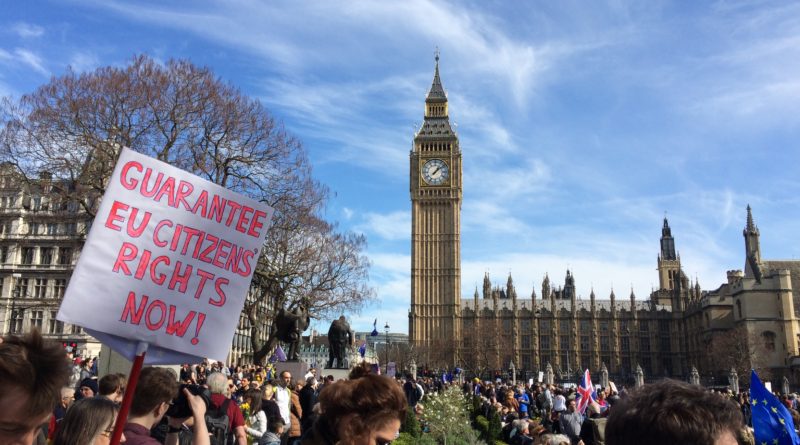Why the offer to EU nationals in the UK is “insufficient”
From ‘pathetic’ to ‘insufficient’: the British offer to EU nationals living in the UK to stay after Brexit has been met with little enthusiasm. Exactly one year after a referendum decided the UK departure from the European Union, the British government has made a proposal on how to treat EU nationals in the future. At present they enjoy the right to reside, work, study, run a business, access healthcare, pensions and social benefits under conditions of equal treatment and with the recognition of their qualifications. They can also bring family members to the country and vote in local elections. But these rights depend on EU Treaties and directives, which will cease to apply after Brexit.
What happens next has been a reason for concern for some 3 million people in the past year. At the European Council meeting on Thursday 22 June, the British Prime Minister offered an answer. She told EU leaders EU nationals in the country before the cut off date (sometime between 29 March this year and the Brexit deadline of March 2019) will be granted the same rights as British citizens. There will be a “grace period” for those who need to build up the 5 years to acquire residence rights. May also promised to reform the permanent residence system, a bureaucratic nightmare engulfing the Home Office and causing anxiety to people. The proposal is conditional to the application of the same conditions to British citizens living in the rest of the EU.
Further details will be presented in parliament on Monday.
“Unacceptable”
While it seems to finally provide some security to EU citizens, the proposal is not as comprehensive as current rights and does not answer many questions: will family unifications be allowed? What will happen to children who aren’t born yet? And who should make sure the deal is applied correctly? On the last issue, in particular, there could be a real clash with the EU, as the British government rejects the jurisdiction of the European Court of Justice and the European Commission wants judges of the European Court to oversee the deal.
An outpour of criticisms appeared on Facebook groups of EU nationals about the British offer. “Theresa May’s announcement falls short of our expectations and is unacceptable in its current form,” commented the3million, a group representing EU citizens in the UK. “There is something slightly pathetic about the Prime Minister’s proposal which makes no reference to the detailed, comprehensive offer tabled by the EU. The prime minister described her proposal as fair and serious. It’s neither fair nor serious,” commented Nicolas Hatton, chair of the3million.
“The offer will not create certainty for EU nationals and their family members in the UK,” added immigration barrister Jan Doerfel. “The ‘offer’ that those EU nationals who have been in the UK lawfully for 5 years will receive settled status promises them something that they already have. The offer that those who have not yet been in the country for 5 years can ‘regularise’ their status presupposes first that they are seen by Theresa May as illegal and without status and secondly, does not answer any questions about what status they would be given, what fees they would have to pay for regularisation and what rights (including rights of family reunion) they would have once their new status is given.”
“Of course, citizens’ rights are codified in law and guaranteed by Treaty, to which the UK has acceded. Accordingly, millions of people have moved around the European Union, with many of them settling in the United Kingdom to live and work. The UK has legal obligations towards them,” wrote Tony Simpson of www.eucitizen2017.org, an initiative to preserve EU citizenship for Britons.
“Theresa May’s offer is at best a good start but far from what we expect. Our research shows that 44% of EU no longer feel welcome since Brexit vote. This is particularly due to the rise in hate crime and the UK’s failure to guarantee our rights unilaterally. Her offer is not an offer and it is misleading,” also commented Samia Badani of free movement group New Europeans.
The institutional response from Europe has been similarly tough. Donald Tusk, president of the European Council said: “My impression is the British offer is below our expectations and risks making the situation worse for our citizens.” Jean-Claude Juncker, president of the European Commission, and the Deputy Minister for Foreign Affairs in Poland also labelled the proposal as “insufficient”.
German Chancellor Angela Merkel said this was a good start but more details are needed and a similar position was taken by the Belgian Prime Minister.
The EU already presented its proposals on the matter, recommending to preserve all rights intact for the lifetime of those affected. This will apply also to British citizens living in other EU countries.
No more trust
There have been many twists and turns on citizens’ rights since the EU referendum of 23 June 2016. During the referendum campaign, it was promised that nothing would change for EU nationals in the UK, regardless of the outcome of the vote. Then the British Prime Minister refused to guarantee their rights unilaterally, claiming this would be done only when rights of British citizens in the rest of the EU would be confirmed too.
In an editorial on the Evening Standard, former Chancellor George Osborne revealed that last June, in the days after the referendum, David Cameron wanted to make a unilateral commitment to secure the status of EU nationals: “All his Cabinet agreed with that unilateral offer, except his Home Secretary, Mrs May, who insisted on blocking it.”
According to reports in The Times and the Spectator last August, Sir Ivan Rogers, former Britain’s ambassador to the EU, also advised the Tory leadership to use the 3 million EU nationals in the UK as “bargaining chips” in Brexit talks because “he thought it would be the only bargaining chip Britain had.”
In the past few months, it was repeated that citizens’ rights are a top priority in the talks and members of the British government promised to make a “generous offer”. In the latest turnaround, at the European Council on Thursday, the offer was defined by Theresa May as “fair and serious”.
The EU Chief Brexit negotiator, Michel Barnier, and his team gauged the opinion of EU citizens meeting representatives of right’s groups. Members of British in Europe also met officials from the German foreign ministry, as well as from the Italian and the Spanish governments. In the UK, there are no reports of similar high level meetings and, unlike other European countries, EU nationals face the barrage of anti-foreign sentiment of British tabloids.
Defining the approach of Brexit negotiations, the EU said talks on a EU-UK trade deal could only start once significant progress will be made on the issues of citizens’ rights, financial settlement and Northern Ireland border. Now negotiations seem to have hit the first stumbling block.
Claudia Delpero © all rights reserved.
Photo courtesy Alberto Santangelo.





